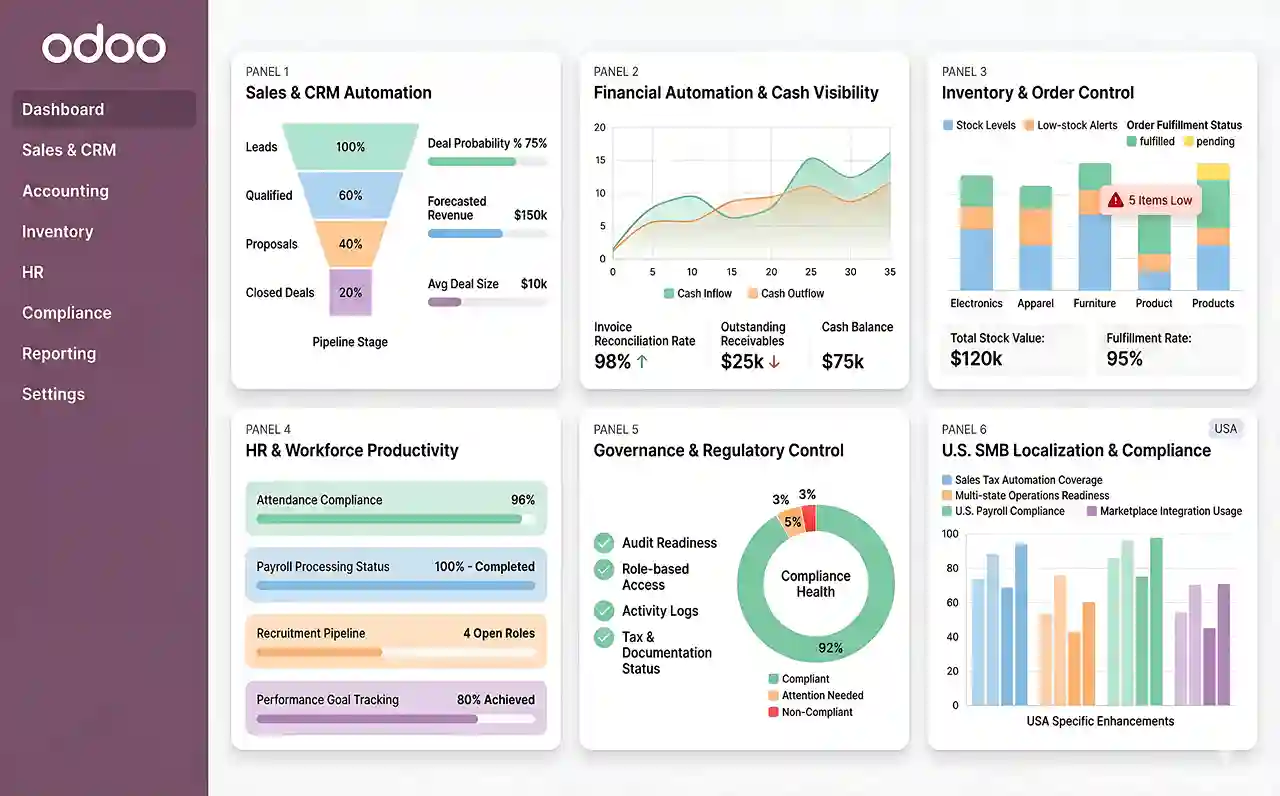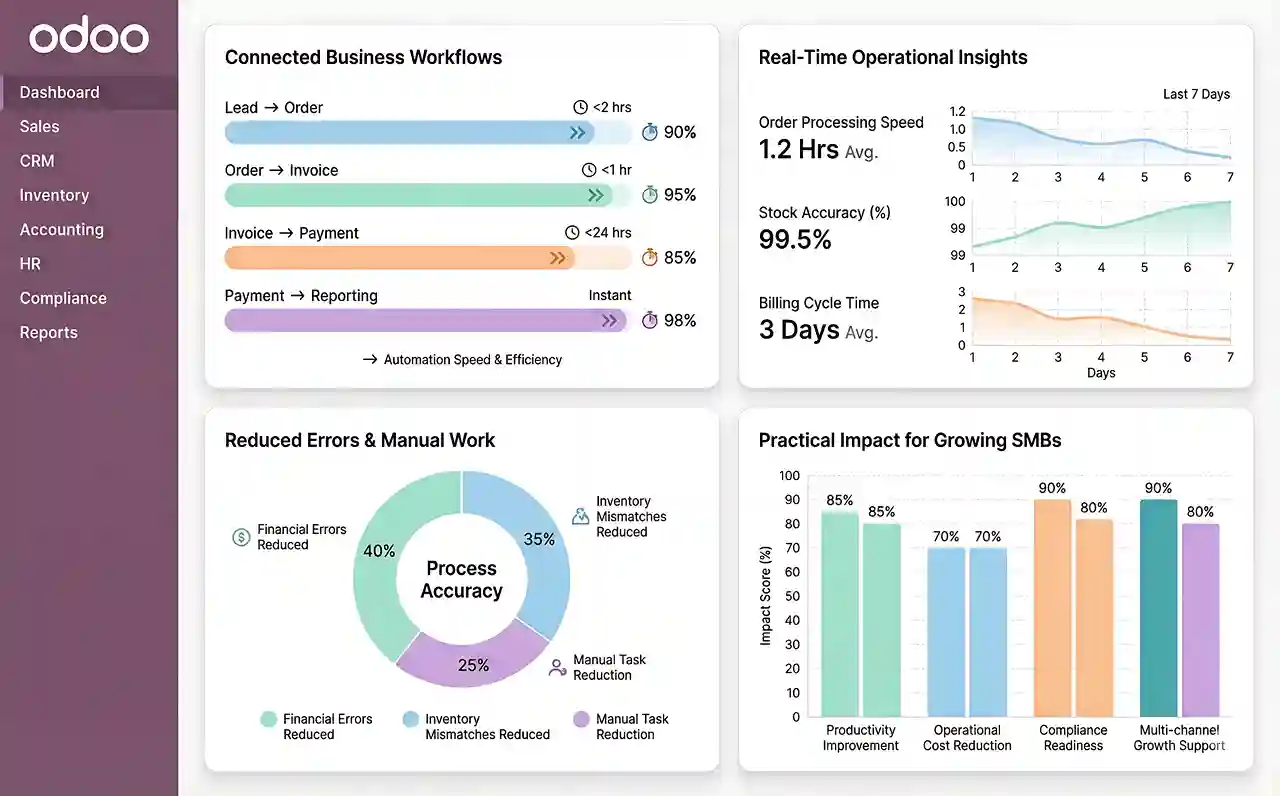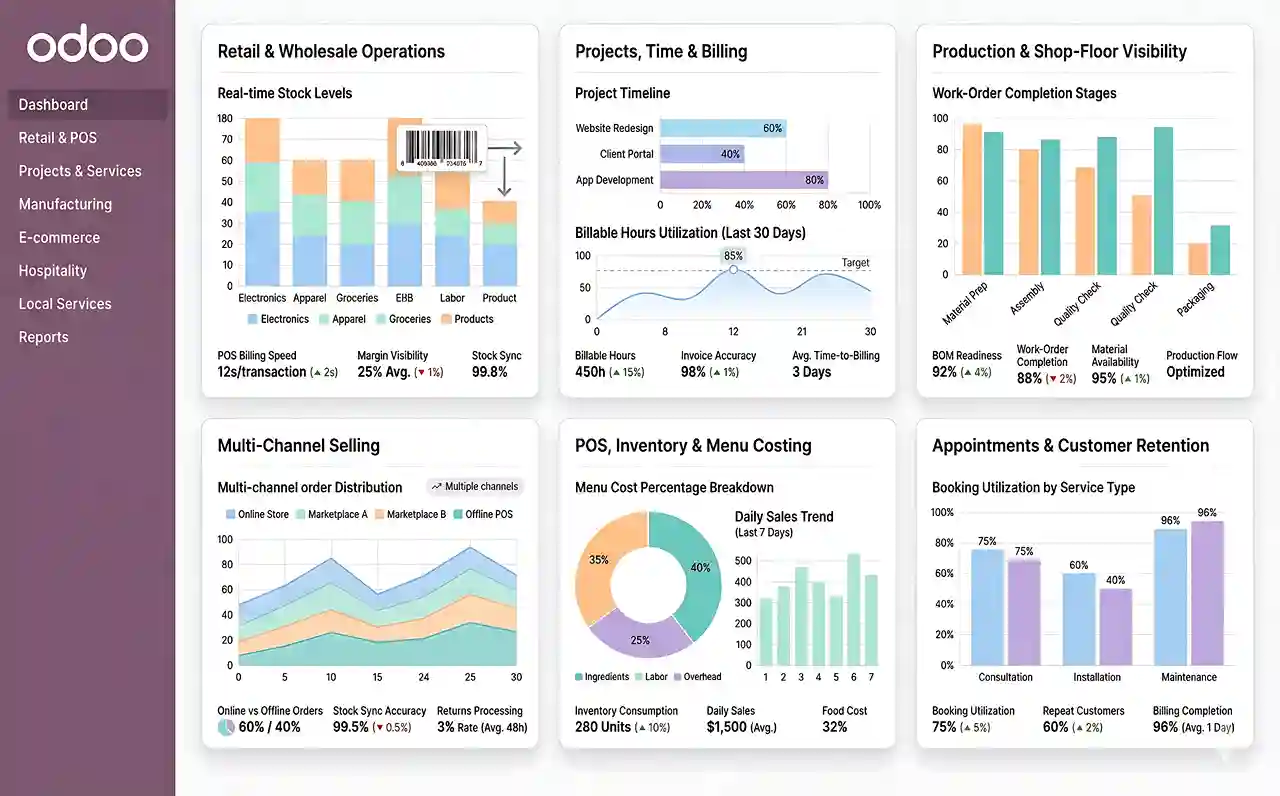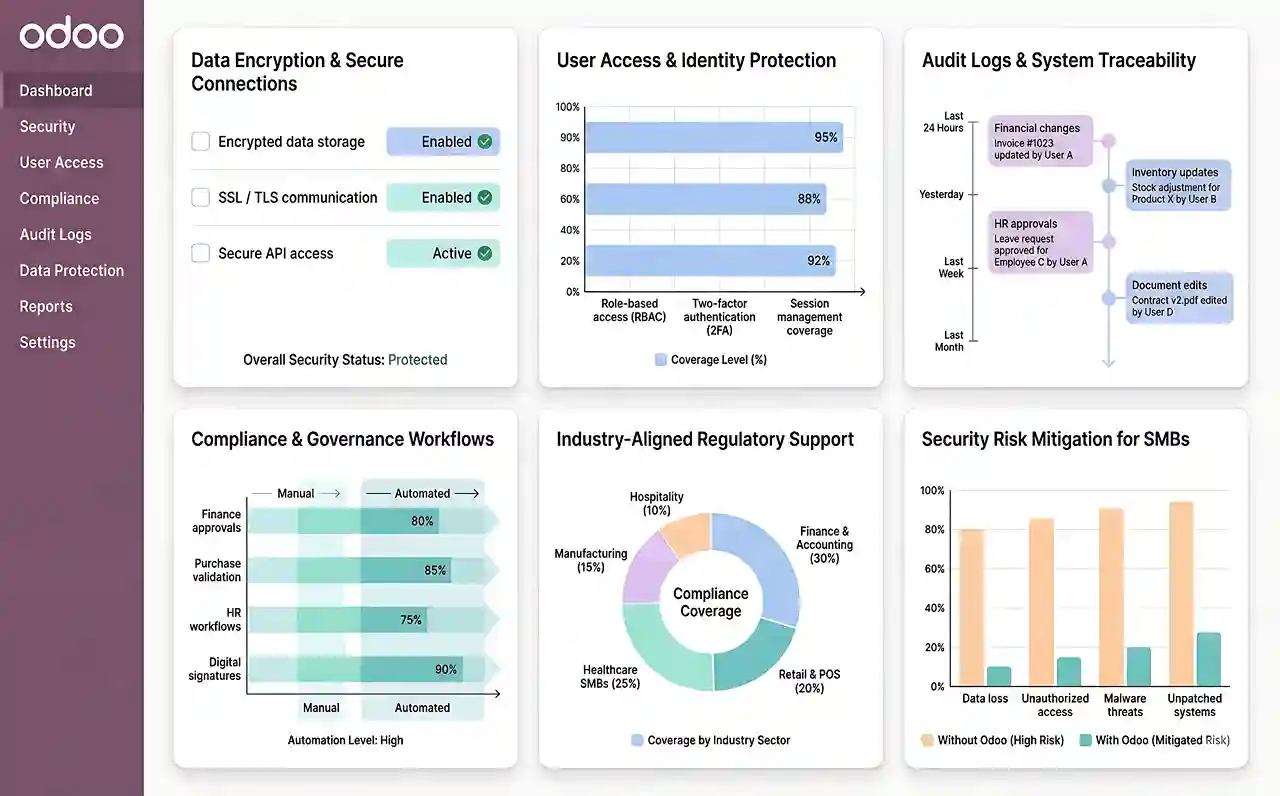Introduction
Small businesses today need faster processes, better visibility, and integrated tools to grow. Odoo for Small Business offers an all-in-one, scalable platform that automates sales, finance, inventory, CRM, and daily operations. For expert setup and optimization, explore this trusted Odoo development company
Additionally, Odoo helps small teams reduce manual tasks, stay compliant, and make smarter decisions with real-time data. Its modular and cost-efficient design makes it a practical choice for SMBs aiming to streamline and scale.
1. Odoo for Small Business: Unified, Scalable & Smart Growth Platform

Odoo for Small Business delivers an integrated, modular ecosystem that helps small companies streamline operations, automate tasks, and improve real-time visibility. It replaces scattered tools with a connected platform that grows at the pace of your business.
Why Odoo for Small Business Is a Game-Changer
- Unified platform for sales, finance, inventory, CRM, HR & more
- Minimal learning curve with intuitive UI
- Real-time dashboards tailored for small business insights
- Modular expansion—start small, scale anytime
- Reduced operational errors and faster decision-making
- Cloud-ready, mobile-friendly, and cost-effective
How It Strengthens Daily Operations
- Centralized customer and vendor management
- Automated invoicing, billing, and financial reconciliation
- Smart inventory tracking with low-stock alerts
- Seamless order-to-delivery workflows
- Built-in tools for compliance and audit-readiness
- Flexible reporting for micro and small enterprises
Additional Insight : For deeper guidance on regulatory needs, read:Odoo for Small Business Compliance – A Practical Guide
2. Core Features & Smart Capabilities of Odoo for Small Business

Odoo for Small Business equips growing companies with intelligent, integrated tools that simplify daily work, reduce manual tasks, and ensure scalable growth. Below is a deep, structured breakdown of the most impactful capabilities.
Odoo for Small Business - Sales, CRM & Customer Lifecycle Management
Odoo enhances how small businesses attract, convert, and retain customers with automated, end-to-end CRM workflows.
Key Capabilities
- Lead capturing from website, email, social media & campaigns
- Automated follow-ups and pipeline movement
- Real-time deal probability scoring
- Customer profiles with communication history
- Sales forecasting dashboards for small teams
- Easy quotation → order → invoice flow
Benefits for Small Businesses
- Higher conversion rates
- Less manual follow-up effort
- Clear visibility of sales performance
- Faster response times improve customer experience
To explore how community-driven innovation supports SMBs, refer to: How the Odoo Community Empowers Small Businesses
Odoo for Small Business Finance, Accounting & Cash-Flow Automation
Odoo simplifies financial operations by automating everyday accounting tasks small businesses struggle with.
Key Capabilities
- Automated invoicing and payment reconciliation
- Expense tracking with approvals
- Multi-currency & multi-jurisdiction support
- P&L, balance sheets & cash-flow reports
- Smart reminders for overdue payments
- Integrated tax management for local compliance
Benefits
- Faster financial closing
- Reduced manual errors
- Real-time cash visibility
- Better compliance readiness
Odoo for Small Business Inventory, Warehouse & Order Management
Odoo offers a streamlined approach for SMBs managing physical goods, ensuring accuracy and operational efficiency.
Key Features
- Real-time stock updates
- Low-stock alerts and automated reordering
- Barcode operations
- Multi-warehouse support
- Order picking, packing & delivery workflow
- Integrated vendor and purchase management
Advantages
- Fewer stockouts
- Precise warehouse control
- Lower carrying costs
- Improved supplier relationships
Odoo for Small Business HR, Payroll & Team Productivity Tools
Small teams gain structured HR workflows that reduce manual administrative work.
Core Tools
- Employee directory & attendance tracking
- Payroll modules with compliance-friendly structures
- Shift planning & scheduling
- Recruitment & onboarding workflows
- Performance tracking with goals/KPIs
Benefits
- Less HR admin time
- Smoother onboarding
- Transparent performance management
Odoo for Small Business Compliance, Reporting & Governance Tools
Odoo supports small businesses with built-in compliance and regulatory management tools.
Key Capabilities
- Audit-ready logs & secure user access
- Automated documentation workflows
- Country-specific tax rules
- Role-based permissions
- Time-stamped activity tracking
Benefits
- Stronger governance
- Lower compliance risks
- Better data clarity and control
Odoo for Small Business USA-Specific Enhancements
Odoo adapts seamlessly to SMB needs in the USA with localized workflows.
USA-Specific Advantages
- Sales tax automation (state, county, federal rules)
- Localized payroll and HR compliance
- Multi-state inventory movement tracking
- E-commerce integrations for U.S. marketplaces
- Automated bookkeeping tailored to U.S. SMBs
Explore more in: How Odoo Benefits Small Businesses in the USA
3. Traditional Tools vs Odoo for Small Business
| Function | Traditional Approach | Odoo for Small Business |
|---|---|---|
| Sales & CRM | Manual follow-ups | Automated pipeline & reminders |
| Accounting | Delayed reconciliation | Real-time invoicing & reports |
| Inventory | No live tracking | Smart stock updates & alerts |
| Orders | Repetitive steps | One-click order-to-invoice |
| HR & Payroll | Paper-based | Centralized attendance & payroll |
| Compliance | Manual logs | Automated audit-ready workflows |
| Reporting | Static spreadsheets | Live dashboards & KPIs |
4. Odoo for Small Business: End-to-End Operational Impact & Practical Advantages

Odoo for Small Business delivers a connected, real-time operational model that helps small companies streamline workflows, reduce repetitive tasks, and work with greater accuracy. Its unified structure ensures data flows smoothly across sales, finance, inventory, HR, and compliance removing silos and enabling faster decision-making.
How Odoo for Small Business Optimizes Daily Operations
- Eliminates duplicate data entry across multiple tools
- Speeds up order processing with automated workflows
- Enhances stock accuracy with real-time tracking
- Supports faster billing, payments, and reconciliations
- Strengthens customer relationships through automated CRM journeys
- Provides complete visibility with customizable dashboards
Why It Matters for Growing SMBs
- Reduces operational overhead
- Improves team productivity and coordination
- Ensures compliance with audit-ready logs
- Minimizes errors in financial and inventory processes
- Supports multichannel growth for retail, services, and wholesale
Relevant Insight : For deeper understanding of community contributions and SMB adoption, explore: How the Odoo Community Empowers Small Businesses
5. Odoo for Small Business - Industry-Specific Use Cases & Real Applications

Small Business is not limited to one type of company. It adapts to multiple industries, helping each segment streamline workflows, control costs, and improve customer experience. Below are practical, real-world use cases that show how small businesses in different sectors benefit from Odoo.
Retail & Wholesale - Smarter Stock, Pricing & POS
Small retail and wholesale businesses often struggle with stock mismatches, manual billing, and disconnected POS systems. Odoo for Small Business solves this with an integrated retail stack.
Key Use Cases:
- Centralized product catalog across store, warehouse, and e-commerce
- Real-time stock visibility at each location
- Barcode-enabled POS for faster billing
- Discount, promotion, and loyalty program management
- Automated purchase orders based on minimum stock rules
Business Impact:
- Fewer stockouts and overstock scenarios
- Faster checkout and better customer experience
- Clear margin visibility across product lines
Service-Based Businesses & Agencies - Projects, Time & Billing
Consulting firms, digital agencies, IT service providers, and small professional firms need visibility across projects, resources, and billing. Odoo for Small Business enables end-to-end service management.
Key Use Cases:
- Project planning with milestones and task breakdown
- Timesheet tracking linked to projects and clients
- Automated invoices based on billable hours or fixed-fee milestones
- Centralized client communication and ticketing
- Resource allocation and utilization reporting
Business Impact:
- Higher billing accuracy
- Reduced revenue leakage from unbilled hours
- Transparent project status for clients and teams
Manufacturing SMBs - Production, BOM & Shop-Floor Visibility
Small manufacturers must manage materials, production orders, and quality without complex legacy ERPs. Odoo for Small Business offers manufacturing tools in a simplified, modular form.
Key Use Cases:
- Bill of Materials (BOM) management for finished goods
- Work orders with step-wise routing
- Material availability checks before production
- Basic MRP planning for small batch production
- Quality checkpoints integrated into production flows
Business Impact:
- Reduced production delays due to missing materials
- Better control over costs per product
- Fewer manual errors in shop-floor execution
E-commerce & Online Sellers - Multi-Channel Selling Made Simple
For small businesses selling online, managing orders, stock, and customers across marketplaces can be chaotic. Odoo for Small Business brings everything into one platform.
Key Use Cases:
- Integration with online stores and marketplaces (website, marketplaces, social)
- Unified order management across multiple channels
- Automatic stock updates when sales are made online or offline
- Centralized customer database for remarketing and support
- Integrated shipping, tracking, and returns workflows
Business Impact:
- No double entry between platforms
- Lower risk of overselling or stock mismatches
- Stronger repeat sales through better customer data
Hospitality, Food & Small F&B Brands - POS, Inventory & Menu Costing
Cafés, restaurants, cloud kitchens, and small F&B brands need quick service and tight control over ingredients. Odoo for Small Business can unify front-of-house and back-of-house operations.
Key Use Cases:
- Restaurant POS with table and order management
- Ingredient-level inventory with consumption tracking
- Recipe and menu costing based on real input prices
- Integration of online orders, dine-in, and delivery partners
- Daily sales and wastage reporting
Business Impact:
- Better control on food cost percentage
- Faster service and accurate orders
- Immediate visibility into profitable and non-profitable items
Professional & Local Services - Clinics, Training Centers, Salons & More
Local businesses like clinics, training institutes, repair centers, and salons need booking, billing, and customer follow-ups in one place. Odoo for Small Business offers a light yet powerful solution.
Key Use Cases:
- Appointment booking with reminders
- Service catalog with pricing and packages
- Automated follow-ups, feedback requests, and re-engagement campaigns
- Simple CRM to track repeat customers
- Integrated billing, GST/tax and basic reporting
Business Impact:
- Fewer no-shows and missed appointments
- Higher retention through structured follow-ups
- Easier financial tracking for small service owners
6. Odoo for Small Business - Future Trends & How Odoo Supports Long-Term Growth

Small businesses are entering a new era where automation, AI, and connected digital ecosystems are essential not optional. Small Business is built to support long-term growth by aligning with emerging technology trends and offering a scalable foundation that evolves with market needs.
Rise of Automation in SMBs
Automation is becoming the defining competitive advantage for small businesses. Manual processes slow growth, reduce accuracy, and increase operational costs.
How Odoo Aligns With Automation Trends
- Automates invoicing, reminders, and reconciliation
- Smart reordering for inventory replenishment
- Workflow triggers for approvals and notifications
- Auto-generated reports & financial summaries
- Automatic lead nurturing inside CRM
AI-Driven SMB Operations
AI is reshaping the way small businesses manage sales, finances, and customer engagement. Odoo continues integrating AI capabilities directly into its core modules.
AI-Enabled Features in Odoo
- AI-powered forecasting (sales, inventory, demand)
- Predictive lead scoring for higher conversions
- Automated data cleaning & document digitization
- Intelligent recommendations for purchase planning
- Chatbots for customer support and FAQs
Integration-First Ecosystems: Future of SMB Digital Infrastructure
Small businesses increasingly rely on multiple digital platforms—e-commerce, marketing, payments, logistics, and more. Odoo supports this shift with an integration-first approach.
Odoo’s Integration Strengths
- Native connectors for Shopify, Amazon, WooCommerce
- Payment integrations (Stripe, PayPal, Razorpay)
- Accounting tools (QuickBooks, Xero)
- Logistics carriers (UPS, FedEx, DHL)
- Marketing platforms (Mailchimp, SMS, WhatsApp APIs)
Odoo’s Roadmap for Small Business Features
Odoo continues to expand its small-business offerings with new innovations and usability improvements every year.
Upcoming & Evolving Areas
- Enhanced mobile-first capabilities
- More automation templates for SMB workflows
- Stronger AI-based recommendation engines
- Simplified onboarding and self-service setup
- Better financial analytics for small business owners
- Faster integrations with modern SaaS tools
Long-Term Scalability & Global Expansion Support
As small businesses grow, their needs become more complex multiple locations, global customers, multi-currency transactions, and larger teams. Odoo is designed to scale naturally.
How Odoo Supports Expansion
- Multi-company & multi-branch structure
- Multi-currency and multi-language features
- Global tax handling across regions
- Centralized reporting for distributed teams
- Cloud infrastructure that grows with demand
7. Odoo for Small Business - Security, Compliance & Data Protection

Security and compliance are major concerns for small businesses that often operate without dedicated IT teams. Odoo provides enterprise-grade security tools and automated compliance workflows, ensuring that sensitive financial, customer, and operational data remains protected. This allows SMBs to focus on growth without worrying about vulnerabilities or regulatory risks.
Data Encryption, Access Control & User Role Management
Odoo uses robust encryption standards and granular permissions to safeguard data across all modules.
Key Security Features
- Encrypted data storage to protect customer and financial information
- SSL/TLS secured communication for all web interactions
- Role-based access control (RBAC) to restrict sensitive data
- Two-factor authentication (2FA) for enhanced login security
- Session management controls for preventing unauthorized access
Audit Logs & Compliance Workflows for Better Governance
Compliance readiness is essential for SMBs handling finances, inventory, customer data, or regulated processes. Odoo automatically tracks changes, approvals, activities, and document updates to support audits.
Built-In Compliance Tools
- Automatic audit logs for every system action
- Document version control for transparent changes
- Approval workflows for finance, purchases & HR
- Traceability reports across inventory, sales & production
- Digital signatures for contracts and approvals
Industry-Specific Compliance Support
Different industries have unique compliance requirements. Odoo for Small Business adapts to regulatory frameworks across sectors such as finance, retail, healthcare, logistics, and professional services.
Compliance Features by Industry
- Financial compliance: tax rules, automated returns, audit trails
- Retail & POS compliance: GST, VAT, sales logs, invoicing rules
- Healthcare SMBs: secure patient data, access control
- Manufacturing: traceability, lot/serial tracking, QC processes
- Hospitality: billing transparency, customer data protection
Avoiding Common Security Risks Faced by SMBs
Small businesses often face security threats due to outdated tools, weak passwords, lack of backups, or scattered software. Odoo mitigates these risks effectively.
Risks Small Businesses Commonly Face
- Using spreadsheets that can be copied or stolen
- No access control or identity verification
- Data loss from hardware failure
- Malware or phishing attacks
- Operating with unpatched software
How Odoo Prevents These Risks
- Centralized cloud data with automatic backups
- Permission-based access to all modules
- Continuous updates & security patches
- Encrypted communication across devices
- Built-in password and session protection
Conclusion
Odoo for Small Business gives small companies a unified, scalable, and automation-driven ecosystem that simplifies everyday operations while improving accuracy and visibility. With integrated workflows across sales, finance, inventory, HR, and compliance, SMBs can reduce manual work, stay competitive, and accelerate growth with confidence.
SDLC Corp stands out as a trusted partner for small businesses adopting Odoo. With deep technical expertise, tailored consulting, and proven industry experience, SDLC Corp ensures smooth implementation, optimized configurations, and long-term support. For expert guidance, explore their Odoo consulting services
FAQ's
What is Odoo for Small Business?
Odoo for Small Business is an all-in-one platform that connects sales, finance, inventory, CRM, HR, and operations into a single, scalable ecosystem. It helps small teams automate daily tasks and gain real-time visibility.
Is Odoo suitable for startups and micro-businesses?
Yes. Odoo’s modular apps allow small and early-stage businesses to start with only essential features and expand as they grow, keeping costs low and workflows simple.
Can Odoo help small businesses improve financial management?
Absolutely. Odoo automates invoicing, payments, reconciliation, and reporting—helping small businesses reduce manual errors and maintain accurate financial records.
Does Odoo support inventory and order management for small retailers?
Yes. Odoo provides real-time stock updates, automated reordering, and streamlined order processing, making it ideal for small retail, wholesale, and service companies.
How does Odoo enhance CRM and customer engagement?
Odoo centralizes customer data, automates follow-ups, and tracks every interaction, helping small businesses improve conversions and deliver better customer experiences.
Can Odoo help small businesses stay compliant?
Yes. Odoo includes audit logs, role-based permissions, tax management tools, and secure documentation workflows—making compliance easier for small companies. For deeper insights, refer to the Small Business Compliance Guide, added earlier.
Why is SDLC Corp the best choice for Odoo for Small Business implementation?
SDLC Corp is trusted for its deep Odoo expertise, industry-specific customization, and proven delivery experience. They provide tailored strategies, seamless implementation, and ongoing support ensuring small businesses get maximum value from their Odoo investment.




